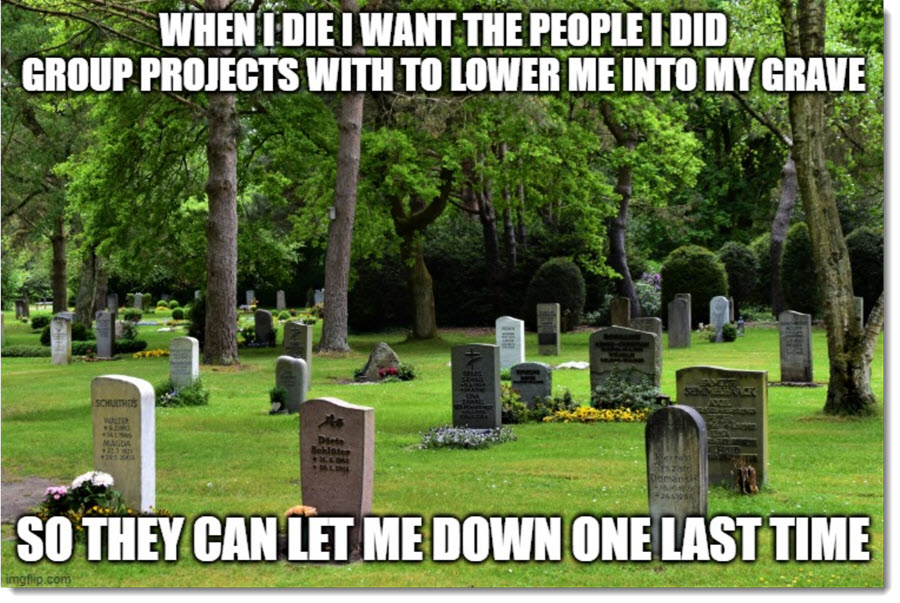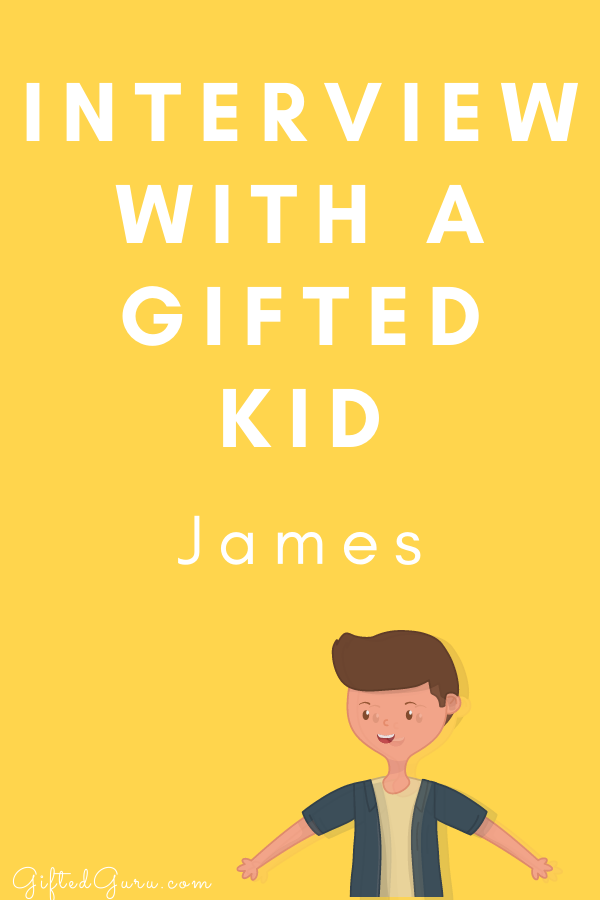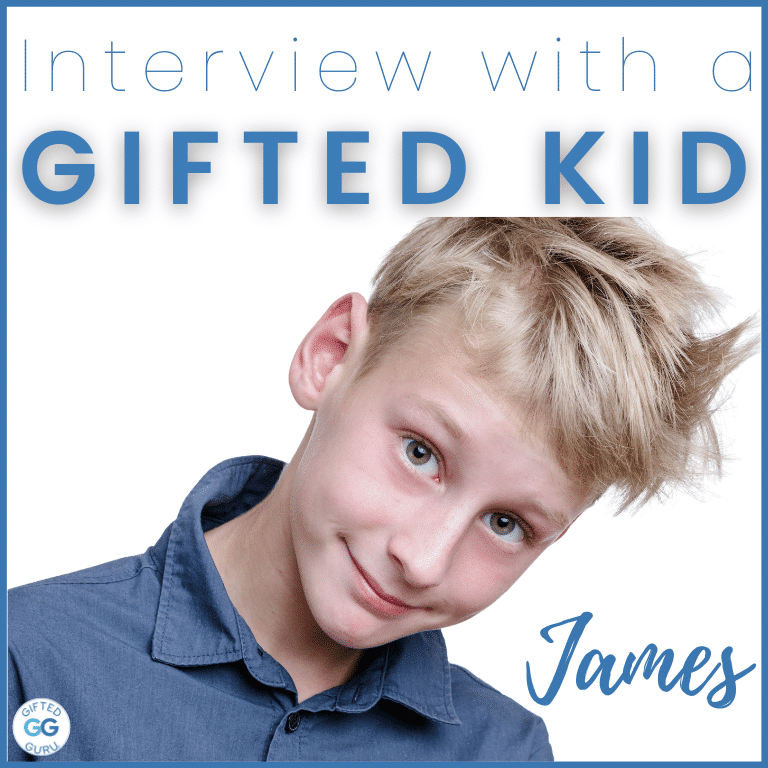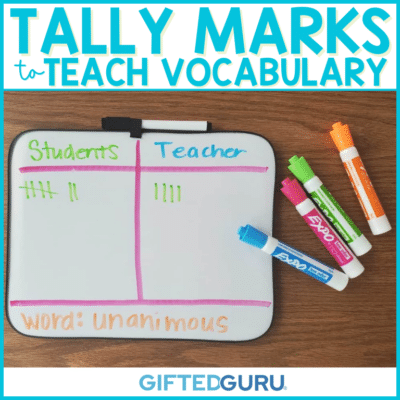In this installment of the Interview with a Gifted Kid series, we’ll meet James, a thirteen-year-old boy from Texas.
I wish the words could convey the wry sense of humor James had. He was hysterically funny, in a very understated way.
In the technical sense, James would fall into the category of twice-exceptional students – those who are gifted and have what I call a gift with purchase. In James’s case, he has been identified as being both gifted and on the autism spectrum.
The Interview with a Gifted Kid Series
As part of my mission to make the world safe for the gifted, I interview
gifted kids (and grown-up gifted kids) and share their stories of life in
Giftedland.
My hope is that it will create a body of voices that will be persuasive that
gifted students have needs, that giftedness isn’t some “get out of hardship in
school free” card, and that it will give hope to gifted individuals that they
are not alone.
If you’d like to be interviewed, please contact me. I want the stories told.
If you’d like to read all of the stories, you can find them here.
Let’s jump into my interview with James.
When did you first realize you were gifted or hear the term “gifted”?
Ever since kindergarten I’ve found puzzles fun and super easy. Math was a breeze. I couldn’t do 7th grade level work or anything, but problems were easy for me.
How was giftedness explained to you?
I took a test, and my mom explained to me that I had a high IQ and I also had autism. I had the testing for both done at the same time.
I didn’t like the testing at the time, but I would like to try it now to see if I liked it more.
Which has most impact on your life, the giftedness or the autism?
Oh, giftedness for sure. Autism is just a word. It doesn’t really mean anything to me.
NOTE: I’d like this made into a tshirt “Autism: It’s just a word.”
How does being gifted affect making friends?
Of course, some people call me a know-it-all when I use correct grammar.
My true friends have always wanted to be my friend. Most of my friends are gifted, but they may or may not have autism.
What about being gifted causes hardship or is hard for you?
Being gifted makes it sort of hard because when you get a problem wrong that you know should have been easy, you’re thinking, “I knew the answer!”
I’ll look at my grade, and if I got an 87, I will not be happy. I got a B+ and I’m mad. I’ll get mad that I got a 97 because I miscalculated on a problem I knew how to do.
I set high expectations for myself. For example, I want my math to be perfect every time. So, I set these high expectations, and when I get one problem wrong, it makes me frustrated.
Now, it doesn’t make me want to try, but it may in the future.
How do you experience other people’s expectations of you?
They try and keep it very secretive.
They either don’t have them, or they do but pretend they don’t and just act amazed when I do well.
What’s the hardest thing at school?
Spelling, no question. Rules should be rules! If there’s no “i” before “e,” then that should be the rule.
But it’s not…There’s except after “c” and fifty other exceptions. Spelling has too many exceptions when it’s supposed to be based on rules.
I’m going into 8th grade, and I’ve been homeschooled since the middle of second grade. I go to science and math at an organization, so that’s not at home
I like homeschooling more because it’s faster and when I’m done, it’s done. When I went to private school, I’d get things done fast, and then I’d just be sitting there.
NOTE: See my articles on ideas for fast finishers. I’ve got one for teachers and one for students.
What do you think about working in groups?
If the groups are made of people like me, I sort of like it. I like the work under my control, so I know it’s done right.
I don’t want to get a bad grade because someone else forgot to do something.
NOTE: Right? This is why I do an entire training on small group instruction and why this is my fave pithy saying of all time:

I created that meme just for this article. I hope it catches on.
If you could go back and tell your younger self something, what would it be?
I used to really hate math. I didn’t want to do it at all because even though I was good at it, I didn’t like it.
I’d tell myself, “Keep trying, and you’ll be able to do a whole sheet of problems.”
Now, I’m okay with math. I’m not to the liking point yet. Maybe in a few years.
My favorite subject is history. It’s like reading a book about a story. Although, I don’t know if I’d like it as much if I were in school because right now it’s not someone lecturing me.
NOTE: We often think that gifted kids innately like everything they’re good at. That’s not true, and it’s a lot of pressure when you have the ability to be good at a lot of things.
What is something you like about school? What’ something you enjoy?
My mom runs a homeschool group, so we get to go on lots of field trips/activities with other kids who are homeschooled.
What is something school could do better?
I think we should have a totally new plan for school: one week on, one week off. No break for summer. Summer is irrelevant.
One problem we are faced with is if both parents work, and also this would have to be for older kids.
I think I need to keep working on this plan.
You took my English class online. What was that experience like for you?
I really liked My Side of the Mountain. I thought that was a good story. I could relate to Sam.
You asked if he should be called Sam the Runaway or Sam the Scientist, and I think he should have been Sam the Runaway Scientist.
NOTE: So, this was interesting. I had inadvertantly put a ceiling on their thinking.
I have a Swiss Army knife. I could take that. You asked that question (What should Sam have taken with him?). I’ve seen people make cups from trees.
I also liked the puppets.
I liked the stories Muffin, All Summer in a Day, and The Bet.
NOTE: The classes are available to view. I linked to the specific stories he mentioned, and you can watch the entire playlist of short stories or either of the novels, My Side of the Mountain or His Majesty’s Dragon.
How do you think your giftedness will affect your adult life?
I’ll probably get a job as engineer.
I don’t know if the autism will affect my job.
I’d really like to go into theme park industry designing rides. Of course, I’d give free tickets for all my teachers.
What do you wish the general population knew about giftedness?
I wish people knew that just because you’re gifted, it doesn’t mean you’re a nerd.
People just assume I’m a nerd. I wouldn’t classify myself as a nerd – wearing glasses and a retainer and a sweater vest and always having a nose in a book.
NOTE: I wrote an entire series of articles on stealth giftedness that address this exact stereotype! You can read them by starting with the first article.
Can you describe your ideal day?
I’d get up, watch tv, do some things to stretch mind, read, do a puzzle, and eat.
There are lots of things I love that stretch my mind.
I’d spend time with friends or my siblings.
NOTE: This is the second person I’ve interviewed whose ideal day was so low-key. Kassidy had a similar day described.
I think we put pressure on ourselves to the cruise director and do these elaborate things to entertain kids, but really we don’t need to do that.
What are some things you care about or worry about?
I care about my dog Bella.
I care about things I’ve collected – old pieces of technology that fascinate me. I have a Walkman. One of really cool ones. You can tune in to tv channels and listen to them. The radio still works – at least it does until digital radio takes over.
I worry about day-to-day things. I think, “Oh no, what if I come home and Bella’s gone? What if there’s a fire?”
I have no reason for this, but it’s there.
I do worry if this virus is ever going to end.
It sounds like we’re in the middle of some really good futuristic novel: “One day, a single virus takes over the world. No one can go out in public. It’s a lab experiment that went terribly wrong.”
NOTE: I think it sounds like a first-grader is narrating the world. “First, there was a virus in China. Then it went all over the world. Then you couldn’t go outside. Then there was no toilet paper. Then there were masks. Then no one went to real school anymore. Then I ate dinner.”
What are your hobbies?
I love board games like Risk, Ticket to Ride, and Pandemic (that’s sort of ironic now).
I also like building things – planes and rockets.
I like reading, and I like to play older video game systems. I played more when I was younger, but I’d really like to get ahold of the second Nintendo and a Gameboy Advance.
What do you like to watch?
I like Disney channel shows from the early 2000s like Austin and Ally, Sweet Life, and Ant Farm.
I like the Marvel movies and the Star Wars movies.
What’s your favorite Star Wars movie?
That’s like asking me to choose between my children. [Long pause]
Okay, I’m going to say one of the prequels: Revenge of the Sith.
What do you like to read?
I like books that just start – they jump in.
Some books start so slowly – “One day Jim was walking through the cherry tree grove ….” And then it goes on and on about what he likes and how he was and what he did to his brother when he was five for ten pages.
And finally, finally you get back to what Jim did when he was walking down the cherry tree grove.
It’s fine for two pages, but not ten.
I like series books. I like the Seraphina Series, and Left Behind: The Kids. There’s lot of action.
I like history books. There’s this great book about the history of the periodic table. (The Secret Life of the Periodic Table: Unlocking the Mysteries of All 118 Elements)
NOTE: People so often connect through books. Because of a great list started by Lynette Breedlove, I have a very robust list of books divided by category that is chock-full of suggestions for great reads for gifted kids.
Wrapping Up:
James highlighted so many key points. He’s just the kind of person I love: someone who just speaks truth. I could have talked to him all day.
Some key ideas I think he shared were:
- Just because we are good at something doesn’t mean we’ll like it.
- Keep your mind open to possibilities. Over and over James mentioned keeping his mind open. He’s open to that he’ll like math more later. He’s open to how his autism may affect his work later. He’s open but not obsessed. This is so healthy. #belikeJames
- Find pleasure in little things. His love of old technology, his description of an optimal day, and his focus on the everyday things was so refreshing.
- Schools need to realize that kids need to be able to move at their pace. It’s just silly that we’re still having this conversation. No one says to the orchestra that they all need to play at the speed and level of the least skilled musician. Please.
- Be open to the flaws of your ideas. When he had his idea for school reform, he recognized its problems right away, but he wasn’t discouraged by those flaws. He was very matter-of-fact about how it needs work. That’s such a great attitude.
- When you have a strong mind, you have an inherent need to stretch that mind.
- Some of the most important educational reform needs to be in reforming group work. It’s a lie that gifted kids can’t work in groups. The lie is that it doesn’t matter if they’re expected to just accept that their grade should be dependent upon anyone else’s work or lack of it.
I love interviewing these kids! If you would like to share your gifted experience (or you have a child who would), please let me know.
If you’re not on the email list and would like to be in the know, make that happen here.
You May Also Like:
- Explore the entire Interview with a Gifted Kid series.
- The Advantages of Acceleration discusses why accelerating gifted kids is almost always the right choice.
- I discuss what’s wrong with (most) book reports in Book Report Badness.
Note: Sometimes I use affiliate links, which means that if you click through and buy something, I get a few pennies (to buy more books!). It will never cost you anything extra.





